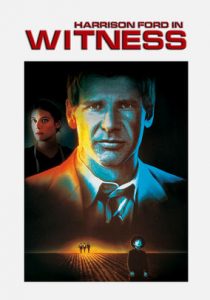Witness-1985
Director Peter Weir
Starring Harrison Ford, Kelly McGillis
Scott’s Review #754
Reviewed May 7, 2018
Grade: A-
Witness (1985) is a slick crime thriller that may at first glance seem like a by-the-numbers genre film but instead is well above average.
As the plot unfolds there are key nail-biting and edge-of-your-seat scenes that build the tension in a way that the suspense master himself, Alfred Hitchcock would be proud of.
Decades later it is tough to watch the film and not notice a slightly dated quality, but at the time it was well-regarded and terrifically paced.
Charismatic Harrison Ford and novice child actor Lukas Haas make the film more than it could have been.
The setting of the film is twofold and presents two different cultures- rural Pennsylvania’s Amish country and the bustling metropolitan Philadelphia.
The death of her husband leads Amish woman Rachel (Kelly McGillis) and her son Samuel (Haas) to the big city to see her sister. While transferring trains Samuel witnesses a brutal murder in the men’s room- unbeknownst to the killers.
This riveting scene (explained more below) triggers the rest of the story.
When Detective John Book (Ford) is assigned to the case and questions Samuel, he is unable to determine who the assailants are. After Samuel’s fingers, an unthinkable suspect, events escalate and John uncovers a mighty corruption circuit within the police force.
John, now targeted, must assimilate into the Amish culture as he strives to protect both Samuel and Rachel (as well as keep himself alive) while embarking on a relationship with Rachel.
The story wisely focuses on the differing lifestyles of the principal characters.
What I enjoy most about Witness is the nice mix between both types of people and different cultures and how they can learn from one another. John is so used to and desensitized by being in the midst of the rat race that he often forgets the nicer things in life- peace or even love.
Rachel and Samuel, of course, are highly sheltered, living in a bubble, and are fish out of water amid the bustling streets of Philadelphia. The counter-cultures offer a nice balance in this masculine film with female sensibilities.
Not to be usurped by pure romance, Witness is at its core, a fleshy, male-driven crime thriller. Adding some softer edges, Weir pleases both male and female audience members and appeals to the masses.
John’s precinct, filled with detectives, police officers, and criminals, gives the film appropriate “guy elements”.
So director Peter Weir offers a good balance here.
I like how Weir chooses to portray the Amish- not caricatures, stereotypes, or to be made fun of, they are sweet, stoic, and intelligent, accepting of John in their lives.
As John learns more about the Amish culture and becomes one of them, this is even more prevalent as an immersion of different cultures- a good lesson to even apply to other differences between peoples.
The acting is a strong component of Witness. Charismatic and handsome, Ford is believable as a fast-paced, busy detective. To add further substance, Ford transforms his character (written as one-note in typical films of this nature) into a sympathetic and inspiring man as he slowly becomes a father figure to wide-eyed youngster Samuel and falls in love with Rachel.
Ford is the standout, but the film would not work with fewer supporting actors. Both innocent and gentle characters, McGillis and Haas add layers to their roles with pronounced toughness and resilience- saving John as much as he saves them.
Two scenes are pure standouts and successfully elicit tension and dramatic effect.
As Samuel witnesses the murder in the bathroom, he is seen in a stall peeking through a crack with only one eye exposed. When he makes a slight noise the assailant violently goes through each stall intent on shooting whatever he finds.
Samuel must think quickly to avoid being caught. The camera goes back and forth between Samuel’s looks of panic and the assailant getting closer and closer to catching him.
Viewer’s hearts will pound during this scene.
Later, as Samuel sees a newspaper clipping framed among a case of awards, he recognizes one man as the assailant. Weir shoots it in slow motion so that the reactions of John and Samuel’s characters are palpable and effective.
The scene is tremendously done and cements the bond and trust between these characters.
Thanks to a wonderful performance by Ford and the cast surrounding him, Witness (1985) successfully widens the traditionally one-dimensional masculine crime thriller into something deeper.
Providing slick entertainment with a great story and substance, the film crosses genres and offers a substantial cinematic experience woefully needed in the mid-1980s.
Oscar Nominations: 2 wins-Best Picture, Best Director-Peter Weir, Best Actor-Harrison Ford, Best Screenplay Written Directly for the Screen (won), Best Original Score, Best Art Direction, Best Cinematography, Best Film Editing (won)
